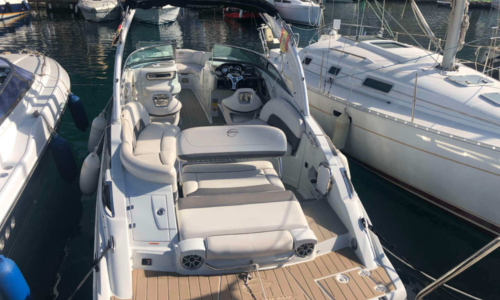Top tips for keeping your boat in excellent condition
Periodic reviews.
Schedule regular check-ups with a qualified mechanic or technician to ensure that all of your boat’s systems are in good working order. This includes the engine, electrical systems, water pumps, navigation systems and any other equipment on board. Regular checks will allow you to detect and fix any problems before they become costly breakdowns.
Clean your boat regularly.
Keep your boat clean and free of dirt, salt and other marine debris. Wash the hull, deck and fittings with fresh water after each outing. Use appropriate cleaning products to protect surfaces and keep them in good condition. Pay particular attention to metal components, as exposure to salt water can cause corrosion. Apply protective products to prevent rust and wear.
Performs proper engine maintenance.
The engine is one of the most important parts of your boat, so make sure it is properly maintained. Perform oil and filter changes according to the manufacturer’s recommendations. Check the coolant level and make sure the cooling system is working properly. Inspect belts, hoses and cables for signs of wear and replace if necessary. Also, keep the engine clean and free of dirt and debris.
Protects the electrical system.
Your boat’s electrical system is essential to the operation of various equipment and systems on board. Regularly check electrical connections to ensure they are clean and tight. Inspect wiring for damage or wear and replace if necessary. Protect electrical components from moisture and corrosion by using appropriate sealants and coatings. Also, make sure you have a battery backup system and always carry jumper cables in case of emergency.
Check the fuel system.
Your boat’s fuel system must be in good condition to ensure safe and efficient operation. Regularly inspect fuel lines for leaks or damage and replace damaged parts immediately. Clean fuel filters and replace them according to the manufacturer’s recommendations. In addition, store fuels properly and use stabiliser additives to prevent sediment formation and degradation.
Keep safety components in good condition.
Make sure your boat’s safety components are in good condition and working properly. This includes life jackets, life rings, fire extinguishers, navigation lights and communication systems. Regularly check the expiry date of life jackets and replace them if necessary. Periodically test safety systems to ensure that they are working properly.
Care for the paintwork and the hull.
Keep your boat’s paintwork in good condition to protect the hull from corrosion and wear. Regularly clean the paint and apply a coat of wax to protect it from UV rays and the marine elements. Also, inspect the hull for cracks, dents or other damage. If you find any problems, repair them immediately to prevent them from getting worse.
Controls humidity and odours on board.
Humidity and odours can be a problem on ships. Use dehumidifiers to control humidity in enclosed spaces and ensure good ventilation on board. Regularly clean areas prone to moisture build-up, such as cabins and storage spaces. In addition, use deodorising products or air fresheners to maintain a fresh and pleasant atmosphere on board.
Protects freshwater and wastewater systems.
If your boat has freshwater and wastewater systems, it is important to keep them in good condition. Regularly inspect hoses and connections for leaks and replace damaged parts. Clean and disinfect freshwater tanks and wastewater systems according to the manufacturer’s recommendations. In addition, use appropriate chemicals to prevent build-up of sediment and unpleasant odours.
Protect your boat during storage.
If you are storing your boat for an extended period of time, it is important to take precautions to protect it. Thoroughly clean the boat before storage and make sure it is completely dry. Remove all valuables and close all openings to prevent insects or rodents from entering. Cover your boat with a tarpaulin or use a suitable cover to protect it from exposure to the elements.
Remember that regular and proper maintenance is essential to keep your boat in excellent condition. Follow these tips and always refer to the manufacturer’s recommendations to ensure the safety and smooth running of your boat – enjoy the freedom and unlimited fun of owning your own boat!
Other news that may interest you
- How to choose the right Crownline model for your lifestyle
- What to bear in mind when anchoring in Mediterranean coves?
- What makes Crownline a leader in recreational boating?
- Apps and technology that make sailing easier for beginners: Navigating has never been easier
- Tips for basic boat maintenance: Keep your boat ready to sail at all times

